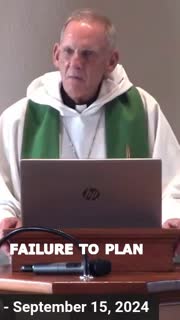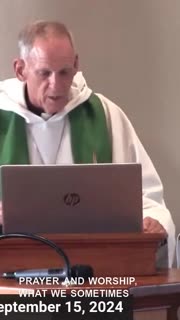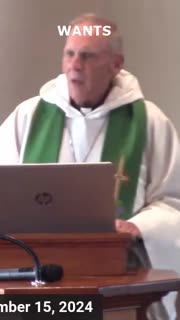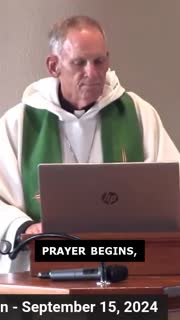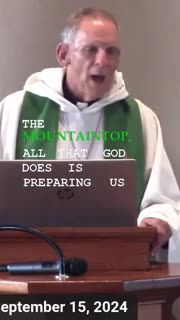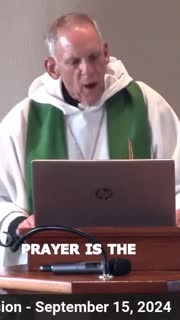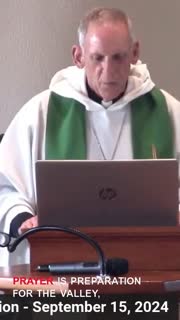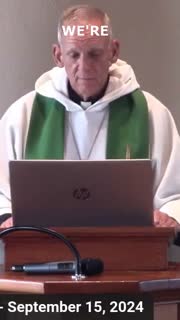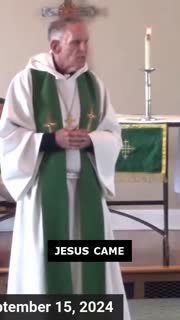Empowered Worship: The Depth of Liturgy and Prayer
Devotional
Sermon Summary
Bible Study Guide
Sermon Clips
1. "Failure to plan is planning to fail is true in the spiritual realm in our walk with God. The preparation we need for the spiritual battles that we face day in and day out. Frankly, I think we're facing spiritual battles more today than ever before. Our culture is moving increasingly away from a godly culture and so we need to be prepared for the spiritual battles that we encounter every single day and don't forget failure to plan is planning to fail and the spiritual preparation that we need is only accomplished in one place and that is the prayer closet." [36:17] (48 seconds)
2. "Prayer and worship, what we sometimes describe as mountaintop experiences, are part of our experience in the Christian walk. When we go away, we can go to a conference, we can go to a worship service, we can get in a place where we really just feel free to pray and worship and, I mean, just really get into it. But prayer and worship, it's part of our experience. Prayer and worship are never meant for mere entertainment value, but to empower us for the work in the valley." [42:30] (36 seconds)
3. "God wants worshipers and prayers before he wants workers. Indeed, the only acceptable workers are those who have learned the lost art of praying and worship. Worship, prayer is preparation for what God has called every single one of us to do, that work in the valley. As the disciples descend from the mountaintop, experiences their demons waiting for them in the valley. This young man, possessed by demons, so thoroughly in Satan's grasp that the other disciples who remain below couldn't cast him out." [42:30] (41 seconds)
4. "Prayer begins, with kind of a holy expectation, but it always ends in holy obedience. If all you're doing is praying, then that's just spiritual narcissism. Prayer is meant to strengthen you, to equip you, to release you, so that you can do the works that God has called us to do. Amy Carmichael, in her book, Edges of His Way, said it this way, and I like this. I believe that if we are to be and to do for others what God means for us to be and to do, we must not let worship and prayer slip into second place." [43:35] (46 seconds)
5. "Certainly we'd all prefer to live on a mountaintop. And, and we really don't care that much for the complicated valley of human needs and suffering. And yet Jesus calls us down from the mountaintop and back into the valley where things get messy, day in and day out. It's not pleasant. In fact, spiritual warfare is often encountered after a mountaintop experience. I can tell you in my own life right before or right after God may use me in some way that is remarkable or powerful, almost always there is a spiritual attack before it or after it." [46:41] (47 seconds)
6. "The mountaintop, all that God does is preparing us to serve others, to deliver people from the works of the enemy. Prayer will determine the success or failure when dealing with the works of evil. Whether we pray or not will determine the outcome of that. The disciples who tried and failed to cast out the demon in the valley had not been with Jesus on the mountaintop. To put it simply, they were not prayed up. Spiritual warfare, as I said, is won or lost every single time in the prayer closet. If you win there, you'll win out there. If you lose there, if you become destroyed, if you become distracted, if you get sidetracked, you'll lose out there." [48:21] (53 seconds)
7. "Prayer is the solution to a full plate. I'm reminded of an entry that was discovered in Martin Luther's diary. He wrote one day, just one of the entries, I'm so busy now that if I did not spend two or three hours in prayer each day, I would not get anything done. I like that. It's the idea that prayer helps us to prioritize. It put things in order. Prayer is the thing that stabilizes us." [52:16] (34 seconds)
8. "Prayer is preparation for the valley, the place where we meet the works of the devil. And when a believer spends time in prayer, I got news for you. You become incredibly dangerous to our enemy. Satan mocks our potlucks, is disdainful of our assemblies. He jeers even in our Bible studies. But Satan trembles when a saint of God falls to his knees in prayer. Prayer is the most powerful force in our universe as it links us with the limited resources of heaven. And it is not so much that prayer changes the circumstances, although it often does. I've seen it, you've seen it, I'm sure. Prayer changes us." [54:28] (52 seconds)
9. "We're not meant to dwell on a mountaintop. For many of us, if you ask people, you know, what is your faith? Oh, I'm a Christian, I go to church. Well, church is the mountaintop for most people. That's where you receive that power. That's when you experience God's presence and you're surrounded by other believers. But the real work of Christianity isn't done in the church building. It's done out on the streets and in the home and our schools and our offices. The real work of Christianity is how we confront the works of the devil. But in order to do that, prayer becomes the essential tool, the most powerful weapon that we have." [57:10] (49 seconds)
10. "Jesus came repairing every place he saw it ripped, the torn fabric of creation. If you could think of creation like a fine Egyptian sheet, you know, high thread count. All of a sudden in the fall, our creation, that sheet was ripped and torn and frayed all over. And the job of Christianity, the job of Jesus, was to repair the torn fabric of creation, wherever it was ripped. Our job as Christians is to do the same. It's to confront the results of sin, to confront the works of the devil, the enemy, and it may be in acts of healing or feeding the hungry or clothing the poor. It may be in casting out demons. It may be in any of these areas. But the way we do it, the way that you're empowered to do it, is prayer." [58:42] (61 seconds)
Ask a question about this sermon
2. "Prayer and worship, what we sometimes describe as mountaintop experiences, are part of our experience in the Christian walk. When we go away, we can go to a conference, we can go to a worship service, we can get in a place where we really just feel free to pray and worship and, I mean, just really get into it. But prayer and worship, it's part of our experience. Prayer and worship are never meant for mere entertainment value, but to empower us for the work in the valley." [42:30] (36 seconds)
3. "God wants worshipers and prayers before he wants workers. Indeed, the only acceptable workers are those who have learned the lost art of praying and worship. Worship, prayer is preparation for what God has called every single one of us to do, that work in the valley. As the disciples descend from the mountaintop, experiences their demons waiting for them in the valley. This young man, possessed by demons, so thoroughly in Satan's grasp that the other disciples who remain below couldn't cast him out." [42:30] (41 seconds)
4. "Prayer begins, with kind of a holy expectation, but it always ends in holy obedience. If all you're doing is praying, then that's just spiritual narcissism. Prayer is meant to strengthen you, to equip you, to release you, so that you can do the works that God has called us to do. Amy Carmichael, in her book, Edges of His Way, said it this way, and I like this. I believe that if we are to be and to do for others what God means for us to be and to do, we must not let worship and prayer slip into second place." [43:35] (46 seconds)
5. "Certainly we'd all prefer to live on a mountaintop. And, and we really don't care that much for the complicated valley of human needs and suffering. And yet Jesus calls us down from the mountaintop and back into the valley where things get messy, day in and day out. It's not pleasant. In fact, spiritual warfare is often encountered after a mountaintop experience. I can tell you in my own life right before or right after God may use me in some way that is remarkable or powerful, almost always there is a spiritual attack before it or after it." [46:41] (47 seconds)
6. "The mountaintop, all that God does is preparing us to serve others, to deliver people from the works of the enemy. Prayer will determine the success or failure when dealing with the works of evil. Whether we pray or not will determine the outcome of that. The disciples who tried and failed to cast out the demon in the valley had not been with Jesus on the mountaintop. To put it simply, they were not prayed up. Spiritual warfare, as I said, is won or lost every single time in the prayer closet. If you win there, you'll win out there. If you lose there, if you become destroyed, if you become distracted, if you get sidetracked, you'll lose out there." [48:21] (53 seconds)
7. "Prayer is the solution to a full plate. I'm reminded of an entry that was discovered in Martin Luther's diary. He wrote one day, just one of the entries, I'm so busy now that if I did not spend two or three hours in prayer each day, I would not get anything done. I like that. It's the idea that prayer helps us to prioritize. It put things in order. Prayer is the thing that stabilizes us." [52:16] (34 seconds)
8. "Prayer is preparation for the valley, the place where we meet the works of the devil. And when a believer spends time in prayer, I got news for you. You become incredibly dangerous to our enemy. Satan mocks our potlucks, is disdainful of our assemblies. He jeers even in our Bible studies. But Satan trembles when a saint of God falls to his knees in prayer. Prayer is the most powerful force in our universe as it links us with the limited resources of heaven. And it is not so much that prayer changes the circumstances, although it often does. I've seen it, you've seen it, I'm sure. Prayer changes us." [54:28] (52 seconds)
9. "We're not meant to dwell on a mountaintop. For many of us, if you ask people, you know, what is your faith? Oh, I'm a Christian, I go to church. Well, church is the mountaintop for most people. That's where you receive that power. That's when you experience God's presence and you're surrounded by other believers. But the real work of Christianity isn't done in the church building. It's done out on the streets and in the home and our schools and our offices. The real work of Christianity is how we confront the works of the devil. But in order to do that, prayer becomes the essential tool, the most powerful weapon that we have." [57:10] (49 seconds)
10. "Jesus came repairing every place he saw it ripped, the torn fabric of creation. If you could think of creation like a fine Egyptian sheet, you know, high thread count. All of a sudden in the fall, our creation, that sheet was ripped and torn and frayed all over. And the job of Christianity, the job of Jesus, was to repair the torn fabric of creation, wherever it was ripped. Our job as Christians is to do the same. It's to confront the results of sin, to confront the works of the devil, the enemy, and it may be in acts of healing or feeding the hungry or clothing the poor. It may be in casting out demons. It may be in any of these areas. But the way we do it, the way that you're empowered to do it, is prayer." [58:42] (61 seconds)
